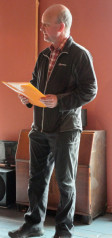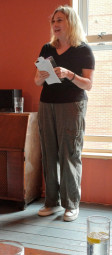Footballer-cricketers and other curiosities: the entertaining poetry world of Matthew Paul

I am an unashamed fan of Matthew Paul’s poetry – so to describe his second collection as long-awaited is no exaggeration, as far as I am concerned. I gladly undertook the train journey from Northumberland to South Yorkshire for the launch of Matthew’s The Last Corinthians at Doncaster Brewery and Tap on Saturday afternoon.
What it’s all about? There’s the humour, for a start, written with acute observation and meticulous detail, often about an area of south-west London bordering on Surrey, where he and I grew up.
But his poetry has a far more universal appeal than that. Matthew Paul’s poems find a lyrical beauty in the apparent everyday. They are conversational in tone, and often anecdotal – two words that are sometimes regarded as breaches of poetry discipline by those teaching it – but that is actually their great strength.
As well as affectionate and amusing portraits of his family, he writes about overlooked subjects such as the impressionist Mike Yarwood, once a TV fixture (“Spitting Image did for me: / nobody wanted my Brucie”) and “the random mix of shameful blokes” that were also part of the repertoire: “Barrymore, Garnett, Enoch Powell … the misremembered painful jokes. / I mean that most sincerely, folks.” Nostalgia’s funny side, and its dark side, too.
There are curios such as yesteryear’s flamboyant racing tipster, Prince Monolulu, complete with ostrich-father headdress (‘Meeting the Prince’); the Walrus Club of pre-first world war Portrush swimmers, all “marram whiskers”, striking out north in “perishing headwinds”; and those extraordinary professional sportsmen who managed to play both football and cricket, the subjects of the collection’s title poem.
One shining example of this breed was batsman, bowler, and footballer Chris Balderstone, who at Queen’s Park, Chesterfield, in 1975, as Matthew relates
reached fifty by the close,
unbuckled his pads, and within the hour was bossing
midfield for Doncaster Rovers. Next day, a hundred
in the bag, he snapped up three quick wickets to clinch
Leicestershire’s first County Championship pennant.
Commit such facts to memory. They could stand you in good stead in a pub quiz one day. In the same poem Matthew remembers one such gifted player at his school, who died in a car crash:
The one time I played in a football team
beside him, he curled a thirty-five-yard free-kick smack
Into the top left corner, as if any old idiot could do that.
But I would’ve shanked it over the bar, the ball spinning
to a stop on a well-dug hole, in a waterlogged allotment.
(‘The Last Corinthians’)
He also has the rare gift of finding poetry in office life, as in ‘Fire Evacuation Procedure’: “Tracy in HR it is, who triggers the alarm one December twilight: / microwaving a mince pie in its silver foil until a massive, cartoon bang.”
Matthew concluded his reading with a touching family poem about greenhouses, referencing his dad’s one, “shipwrecked by ivy”, and how he proposed to his wife Lyn that they should get one themselves. I’d like to write more about poems that he didn’t read out on Saturday, but perhaps I’ll save them for a fuller review of The Last Corinthians. For now I’ll just say, I can’t recommend this book highly enough.

He has also, rather bravely, assembled a group of poems about an IRA double-agent codenamed Stakeknife, and admitted: “I’m a little nervous talking about it.” In one of the poems the alleged agent, resettled under witness protection in England, answers a dog walker’s query by saying he used to be a spy: “She laughed, Englishly.”
Victoria Gatehouse’s recent collection The Hawthorn Bride has been reviewed very favourably by Neil Leadbeater for Write Out Loud. At the Brewery and Tap she told us that her book started life at a Poetry School masterclass, writing about trees. The title poem talks of the hawthorn’s “scent of musk and decay / a foretaste of what’s to come.” It contains the same chemical as decaying flesh, she explained.

Victoria Gatehouse writes children’s poetry as well, and has written a poem about peat in a book about bogs due to be published soon: “Peat has so much to teach us … that it’s ok to take things slow.”
The launch of Matthew Paul’s impressively produced collection - in many ways a sequel to his debut publication The Evening Entertainment - was introduced by newbie poetry publisher Tim Fellows, of Crooked Spire Press, which came into being only two months ago. You can find out more about Crooked Spire here.
Matthew Paul moved from the south to Rotherham a few years ago. I can only add that this was a wonderfully relaxed and friendly poetry event, with every poem applauded, which some people may tell you is not really the done thing on such occasions. But maybe it is in South Yorkshire. The Doncaster Brewery and Tap venue also hosts a regular open-mic night, is handy for the train, and brews its own excellent beer.
Matthew Paul, The Last Corinthians, Crooked Spire Press, £12.50




